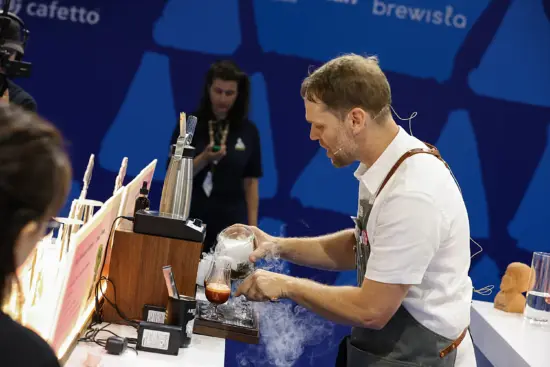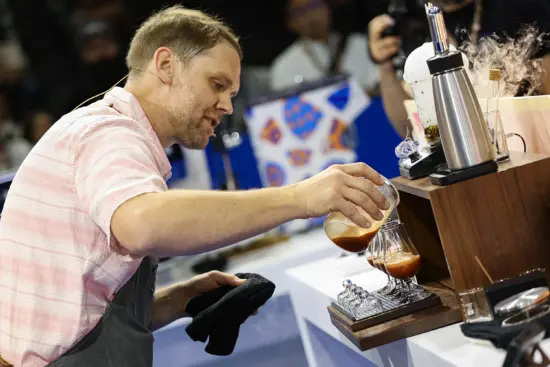Isaiah Sheese Reflects on Earning Fourth at the World Barista Championship: Part One
The reigning U.S. Barista Champion earned his way to the final round and a fourth-place finish at his first-ever World Barista Championship last month.
BY CHRIS RYAN
BARISTA MAGAZINE ONLINE
Photos courtesy of the Specialty Coffee Association
At last month’s World of Coffee trade show in Athens, Greece, thousands of coffee professionals descended on the event for its many festivities, including the World Barista Championship (WBC).
In one corner of the show, on that WBC stage, Isaiah Sheese had his first taste of international coffee competition. The Barista competitor, who owns Archetype Coffee in Omaha, Neb., has competed in the United States since 2009; in 2023, he won the United Barista Championship (USBC) for the first time, earning his place on the WBC stage.
And while he was a first-time presence at the WBC, Isaiah shone on the big stage, advancing through the first two rounds to reach the World Barista Championship finals, where he placed fourth in the world.
We caught up with Isaiah to hear about his experience representing the United States in Athens. In today’s first part, we talk about how he evolved his routine for the WBC, his mindset for the event, and much more.

This interview has been lightly edited for clarity and length.
Barista Magazine: The last time we talked—when you had recently won the USBC—you mentioned expanding your routine for WBC with one of the different stage setups they offer. What did that end up looking like?
Isaiah Sheese: At worlds, you can choose from nine different stages. We ended up choosing a stage that has two tables that are parallel, so we actually moved the judges. I served my espresso, served my milk drink, and then we asked the judges to walk around to another table with another complete setup that was bigger than what we did at nationals, and I served my signature drink on that table.
It was cool in one regard, but in the other regard, it made my (15-minute) setup time so hard because I was setting up two full tables. Normally I only practice setting up like once because I’ve done it so many times that I have it pretty much down—I can get everything set up in five minutes and then have five minutes to dial in and then usually two minutes to clean up, and then I try to be done well before that 15 minutes so that I can honestly just relax.
For worlds, I had to practice my setup so many times (laughs). The first time I did my setup at WBC, and in the run-through, I didn’t get everything done, and I was like, shoot. Second time, I got everything done but forgot one thing. The third time I was like, OK, I can do this.

It sounds like you practiced a lot if all that work was just on the setup.
This is hands down the most I’ve practiced, ever. Which it should be! You’re representing your country; if you’re going to be a true champion, that’s what it takes. For me, it’s a fine line when you’re performing of not being a robot, and I feel like in the past I’d practice to a spot where it almost became robotic, and I lost the human connection. This is the first time that I think I pushed past the robotic stage where it almost became a whole other level of freedom in my routine that I don’t think I’ve ever really done. But the amount of time that that takes is a lot; I put in lots of extra hours in our training space. We hung signs all over the doors—“Please do not bother, competition practice” (laughs).
What was your mindset going into WBC, other than the obvious goal of any competition to try to win?
Yeah, any competition, the goal is always to win. Winning the U.S. has always been a huge hurdle. Yes I wanted to win the worlds, but I think winning the U.S. in this day and age is just a huge accomplishment, and a hard thing to do. So I was super proud going to Athens. And what’s funny is I’ve always said that I felt it’s harder to win the U.S. than it is to place top six at worlds. And then when I won the U.S. I was like, oh shoot, I’ve been saying this for years, I hope I can live up to the words that I’ve been saying (laughs).

You’ve competed for many years at the national level; what did the WBC stage feel like for you? Were the lights noticeably brighter?
I try to stay pretty even-keeled, as much as possible. The nerves are there, the pressure is there, knowing I may never get another chance to be on that stage. Some of this year’s finalists and their coaches are famous competitors you’ve seen over the years, and then all of a sudden you’re going head to head. For me it was just like, stay calm and collected, and do what you do. Once again, the competition is really about being your best self and beating yourself. And so although it could have been easy to give in to those things, for me it’s just like, we’re gonna go out there and do what we worked on. I tried to keep myself in that good head space. Otherwise it could have been easy to get intimidated by the grandeur of the World Barista Championship.
Stay tuned for part two of this interview tomorrow at Barista Magazine Online.

READ THE LATEST BARISTA MAGAZINE
Out now: It’s the June + July 2023 issue of Barista Magazine featuring Martin Shabaya of Kenya on the cover. Read it for free with our digital edition. Get your Barista Magazine delivered; start a subscription today! Visit our online store to renew your subscription or order back issues.
Source: Barista Magazine



